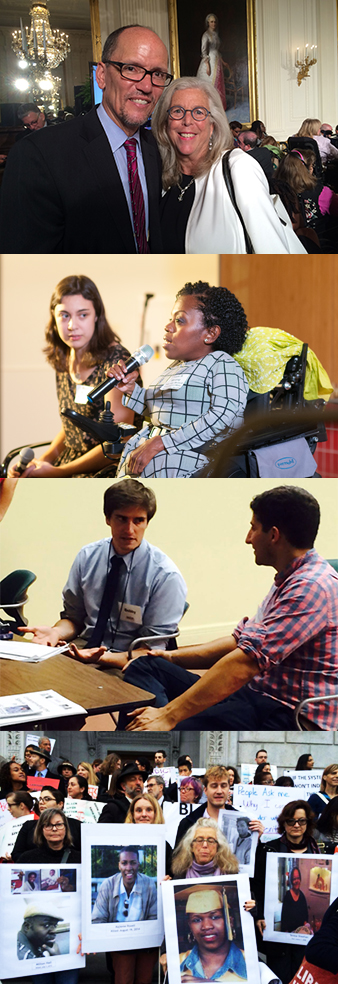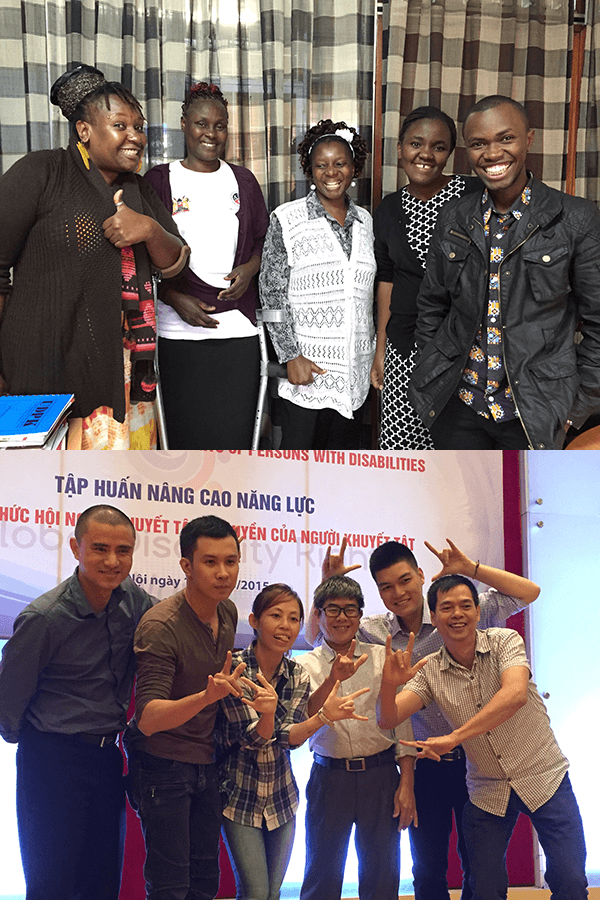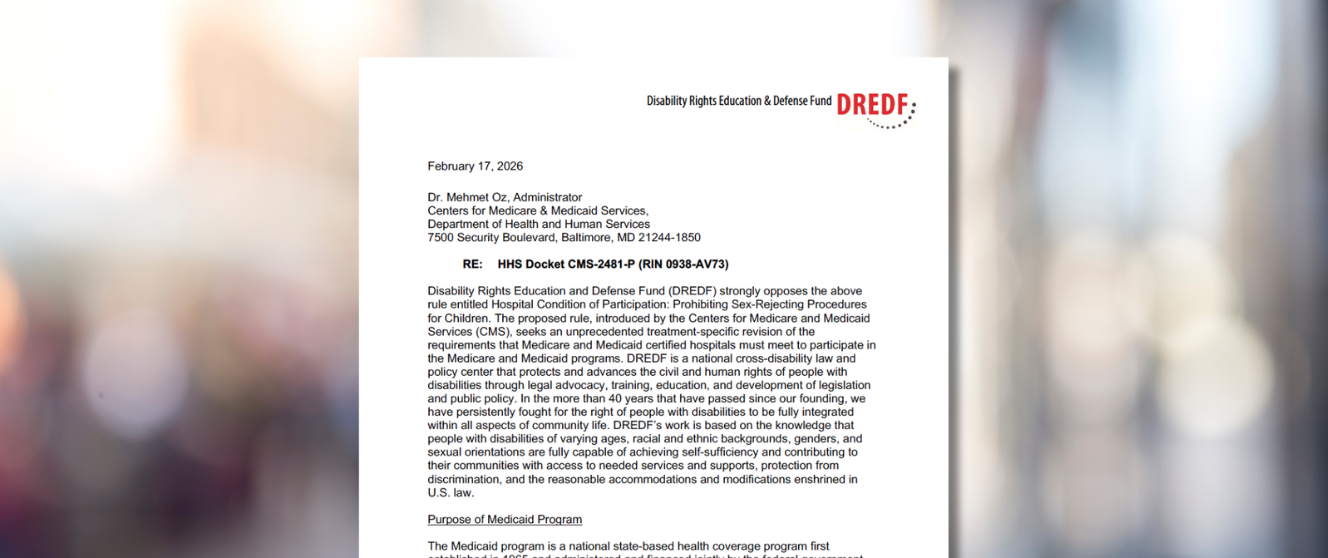
Thank you for joining — again — with
Disability Rights Education & Defense Fund
in the fight for cross-disability equality and inclusion.
Your shared commitment to disability justice allowed us to be vigorous advocates who were prepared to bring disability rights to the table — whether that table was in the courthouse, the schoolhouse, or the White House.
You kept us free to pursue impact litigation that expanded communication and tech access, and protected public benefits. You kept us working with 1,000 Bay Area families on education access and shaping national policy on the school-to-prison pipeline that threatens disabled youth of color.
Your steadfast support meant we could take on research and analysis for national healthcare, school discipline, and transportation policy; it meant we could train and learn from fellow disability advocates in 4 countries; and much more.
You helped foster intergenerational learning at our 36th anniversary celebration and history through “The Making of the ADA” video series, all during the 25th year of the Americans with Disabilities Act (ADA) and the 40th of the Individuals with Disabilities Education Act (IDEA).
DREDF’s agenda is clear: We work at the intersection where disability meets racial injustice, poverty, violence, gender discrimination, and more. We fight for equal access to education, public benefits, health care, and transportation in the bricks-and-mortar world and online. We amplify voices, convene coalitions, and advance our legal rights.
Read on for past year highlights that you helped us achieve.
Increasing access through impact litigation, amici & collaboration

DREDF, the National Association of the Deaf (NAD), and Lewis, Feinberg, Lee & Jackson, P.C. reached an agreement that will extend Amazon’s ongoing captioning through its on-demand entertainment service, Amazon Video. With these same partners, we negotiated an agreement with VUDU, a part of Walmart, to close caption 100% of its programming streamed through its Video on Demand service.
DREDF, the NAD, the Civil Rights Education and Enforcement Center, Disability Law Center, Inc., and Lewis, Feinberg, Lee, Renaker & Jackson P.C. filed a complaint against MIT when deaf and hard of hearing individuals were excluded from life-long learning in massive open online courses (MOOCs).
DREDF’s investigation into the Centers for Medicare and Medicaid Services’ (CMS) inaccessible applications, notices, forms, outreach materials, web—based information, telephonic communications continued on behalf of blind and vision—impaired healthcare consumers.
Our special education compliance complaint against the Mt. Diablo Unified School District on behalf of two very young students with disabilities subjected to physical restraint and seclusion was prominently featured in an April 2015 investigative report by EdSource. The report concludes that “a shadow discipline” system exists in many special education classrooms across California.
Ending inequity in education through legal action & training
DREDF, Equal Justice Society, National Center for Youth Law, and Antioch Unified School District announced a groundbreaking effort to identify the causes of disparities in school discipline by examining how race, disability, and discipline intersect.
DREDF continued its work to disrupt the school—to—prison pipeline for students of color with disabilities through drafting the National Council on Disability’s (NCD) report on ending disparities in discipline and promoting positive outcomes for disabled students of color.
DREDF’s 29th year as a designated Parent Training & Information Center (PTI) resulted in more than 1,000 parents and family caregivers becoming skilled advocates for students with disabilities, improving educational access and long-term self-sufficiency.
Our Foster Youth Resources for Education (FYRE) program continued its second decade of fighting for the rights of foster youth disabilities, using strategies we pioneered, including teaching child welfare professionals how to navigate special education systems.
Education Advocates held 34 free special education advocacy trainings. 10 issues of our newsletter, Special EDition provided guidance to over 5,000 subscribers.
Driving transportation policy into the 21st century
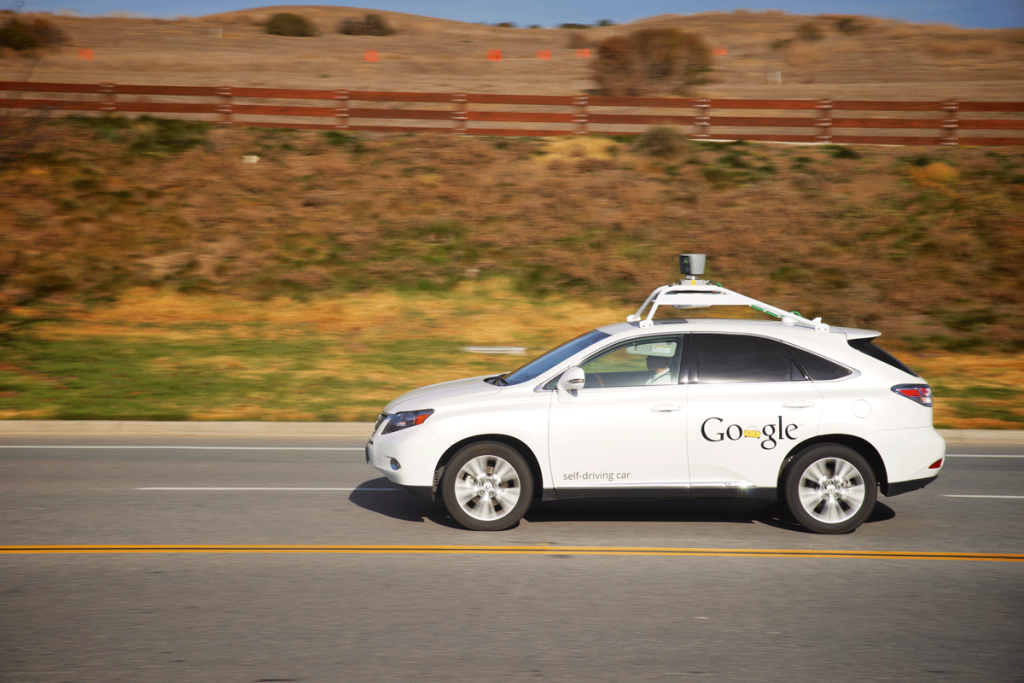
2015 saw the release of 3 major reports researched and authored by DREDF that showcase how transportation policy is taking off into new territory even as established public systems need continued oversight. Published by NCD, “Self-Driving Cars: Mapping Access to a Technology Revolution” aims at barriers related to driverless cars, making sure that people with disabilities are part of this transportation revolution. The NCD also published “Transportation Update: Where We’ve Gone and What We’ve Learned,” a state-of-the-systems report on established modes of travel plus rapidly growing ride-sharing networks, such as Uber and Lyft. Finally, the Federal Transit Administration’s (FTA) collaborative “Accessible Transit Services for All” focuses on paratransit throughout the nation.
Building access into health policy, medical settings & bioethics
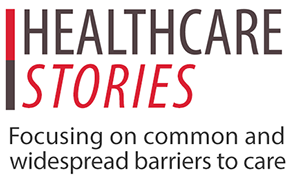 DREDF continued as the leading cross-disability voice on the roll-out of the Affordable Care Act, applying decades of disability health policy experience to build on the ACA’s potential for reducing health disparities. We analyzed recommendations from diverse health policy experts on improving healthcare services and facilities for people with disabilities, including people with developmental disabilities, and to shed light on how the intersection of disability and race affects health care. In one year, we presented 8 collaborative webinars on navigating the new managed care systems and on best practices in community health, and submitted 10 sets of substantive comments (a set of “comments” being, on average, 29 pages of data, analysis, and recommendations) to government agencies on how to provide nondiscriminatory health care to people with disabilities. All materials are available on this website.
DREDF continued as the leading cross-disability voice on the roll-out of the Affordable Care Act, applying decades of disability health policy experience to build on the ACA’s potential for reducing health disparities. We analyzed recommendations from diverse health policy experts on improving healthcare services and facilities for people with disabilities, including people with developmental disabilities, and to shed light on how the intersection of disability and race affects health care. In one year, we presented 8 collaborative webinars on navigating the new managed care systems and on best practices in community health, and submitted 10 sets of substantive comments (a set of “comments” being, on average, 29 pages of data, analysis, and recommendations) to government agencies on how to provide nondiscriminatory health care to people with disabilities. All materials are available on this website.
Advocates and practitioners continued sharing our acclaimed HEALTHCARE STORIES digital series that features stories about inaccessible examination tables and weight scales and provider misperceptions and stereotypes.
Strengthening global disability rights with in-country advocates
DREDF, partnering with Mobility International USA (MIUSA) and US International Council on Disabilities (USICD), continued working with local leaders in Kenya, Mexico, Vietnam, and Armenia on RightsNow! Strong Communities Through Enforcing the Rights of Persons with Disabilities.
DREDF staff met regularly with human rights advocates who visited our international disability rights center, the Ed Roberts Campus, in addition to presenting at a Fulbright Scholars meeting on disability human rights.
Knowledge is Power: Sign up for our digital newsletters, connect with us on Facebook and follow us on Twitter. Check out HEALTHCARE STORIES, plus recent and historical videos on DREDF’s Vimeo and YouTube channels.
“No group has been more instrumental in advancing the cause of civil rights for all people with disabilities than DREDF.” — Senator Tom Harkin, September 3, 2014
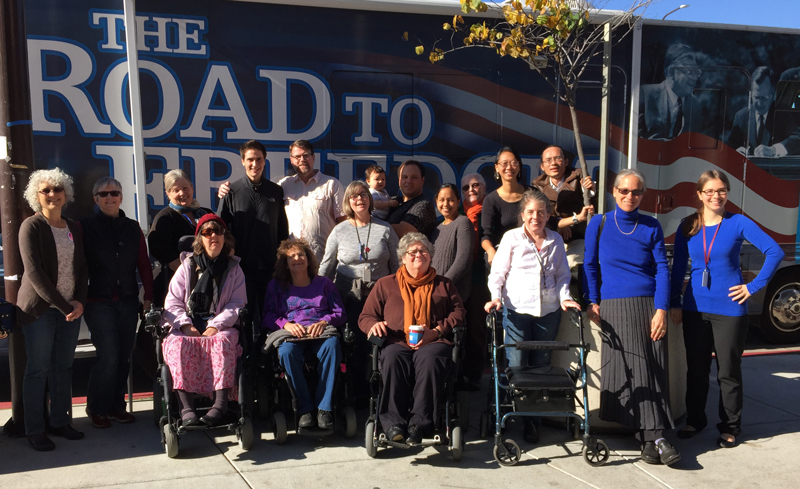
About DREDF: Disability Rights Education & Defense Fund (DREDF) was founded in 1979 as a unique alliance of adults with disabilities and parents of children with disabilities that focuses on civil and human rights issues that promote the integration of people with disabilities into the mainstream of society. We are nationally recognized for our disability rights legal expertise and have a growing international presence.

Today, DREDF is a hub that’s cross-disability, cross-community, cross-issue, making us a small organization with a long reach. Our budget is under $2M/year and we use it wisely by working in coalition, pursuing system-wide reforms, and picking cases and legislation that will have a broad impact. We have a staff of 17 in Berkeley, and every year we welcome legal interns and law students who want to be part of the future of public service. Nearly every staff/board member is a person with a disability and/or family member of a person with a disability.
We’re proud of our work.
We’re even prouder that we don’t do it alone.
We appreciate every donation, every gift of volunteer time, every partnership that advances disability rights.
Have a question about making a gift? Contact Susan Freundlich, Director of Development, at sfreundlich@dredf.org or 510-644-2555 ext. 5246. DREDF, 3075 Adeline St., Ste. 210, Berkeley, CA 94703.
We gratefully accept financial contributions, stock gifts, vehicle donations through CARS, and thank you for participating in the Combined Federal Campaign (CFC # 11944).
Print the Donation Form and mail it to:
Disability Rights Education & Defense Fund
Development Department
3075 Adeline Street, Suite 210
Berkeley, CA 94703
